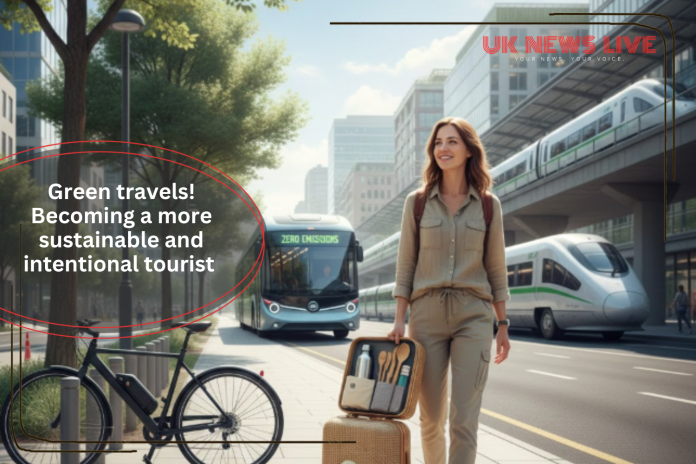Travelling is a favourite pastime for many, offering a welcome change of scenery and the chance to experience new cultures, sample unfamiliar cuisines, and discover different landmarks.
In the aftermath of the COVID-19 pandemic, travel has steadily increased—both internationally and domestically—as people seek out fresh experiences once again.
Yet, alongside the personal enrichment it brings, travelling has a high environmental cost.
Eco-friendly Travelling Is a Choice
Recent research indicates that sustainability matters to 84% of travellers, but taking concrete steps to reduce emissions can be challenging in practice.
In fact, a different study showed that many are unsure about what sustainable travelling actually means and entails, while others would like to be sustainable but are concerned about the possibility of paying more for eco-friendly journeys.
Rethinking the ways in which you travel is nonetheless essential if you’re looking to become more sustainable, so if you’ve been thinking of adopting a new attitude when it comes to visiting different cities or countries, here are a few of the things you should consider.
1. The Environment

Most people know that climate change is an issue that affects the entire planet, but the full scope of what’s going on is not fully understood by many. To put things into perspective, one of the fundamental things you need to know is that the concentration of carbon dioxide in the atmosphere nowadays is 400 parts per million higher than it has been during at least the last 800,000 years. Not only that, it is not decreasing or at least stagnating at all. Instead, it continues to increase. In 2024, temperatures surpassed the 1.5 °C threshold for the first time in history.
Animals and plants are threatened with extinction as urban sprawl grows, agriculture and forestry become more intensive, pollution increases, and resources continue to be extracted. Hunting also impacts biodiversity, and these phenomena occur worldwide.
2. Becoming Sustainable

Integrating sustainability in your daily life is not about making a few large gestures now and then. It’s about adopting a new attitude and approach to the way in which you live your daily life. When it comes to travelling, this includes how you pack your luggage, the hotels you choose, and the things you choose to do after you arrive at the destination. Something small, such as getting a UK eSIM from Holafly before leaving, to ensure seamless connectivity and enjoy reliable internet regardless of where you are, can have a huge impact.
The devices are much more sustainable than the standard SIM cards, as they eliminate the issues of plastic waste and pollution (a serious problem due to the presence of microplastics, whose impact on health is still studied but already understood to be extremely detrimental). Traditional SIM cards are also created via a process that is responsible for a sizable quantity of carbon emissions, as well as a reliance on physical resources.
To come up with the best solutions, look at the way in which you’re travelling right now. Identify what the problem areas might be and switch to the more sustainable alternatives instead.
3. The Luggage
One of the things you might not even notice is the way you pack your luggage. Travelling lighter is not only beneficial because you avoid the risk of having to dispose of items or because it becomes easier to move around by bike or take public transport without constantly bumping into people. It is also more fuel-efficient, especially when you prioritise compact, eco-friendly packaged products that reduce both weight and waste.

This is particularly important when it comes to air travel, a sector that is already well-known for its elevated emissions. Heavier planes need more fuel to fly, so when you pack lighter, you decrease the plane’s weight. Even a small difference can result in less fuel being burnt and a lessened environmental impact overall.
Packing light allows you to be more selective with the items you bring along as well. Reusable or multipurpose items should be a priority, and the clothing you get must be practical and fitting for the things you want to do. For instance, if you plan to walk a lot and visit many different places, there’s no point in bringing an elegant gown or heels along just because there’s a tiny chance that you might have time for an elegant dinner one evening. You’ll most certainly be able to find locations that don’t require a strict dress code anyway. Single-use plastics shouldn’t be part of your luggage either, especially if they’re items that you could bring to areas such as the beach, where they can be incredibly detrimental to the well-being of marine life.
A reusable water bottle and paper straws are far more practical, and bringing a cloth tote bag for grocery shopping helps you avoid purchasing a new plastic bag each time.
4. The Transport

The most effective way to reduce your emissions when travelling is to shorten the distances you cover or seek out more sustainable modes of transport. Planes remain the largest contributors in this respect, with cars performing somewhat better and trains being considerably preferable. The way you move around once you reach your destination is equally important. Whenever possible, walking or cycling is ideal, and public transport—at the very least—offers a significantly lower-impact alternative. Electric buses powered by on-board batteries, overhead lines, or hydrogen fuel cells are becoming increasingly common; beyond their zero tailpipe emissions, they operate more quietly and carry lower overall running costs.
When rail travel is not feasible, there are still ways to identify flights with comparatively low CO₂ emissions. Several online tools highlight routes that perform better than average, and there are additional strategies for reducing your overall impact. Extending the length of your stay, supporting conservation initiatives, adopting a predominantly plant-based diet, and contributing to local or Indigenous communities can all play a meaningful role.
Travelling is a source of joy for many, but it is equally important to remain mindful of how you move through the world. If you are aiming to travel more sustainably, beginning with these practices offers a thoughtful place to start.





























